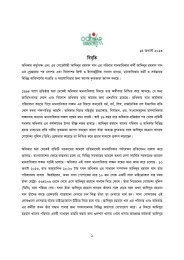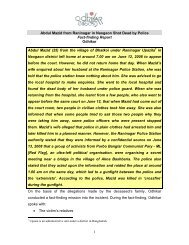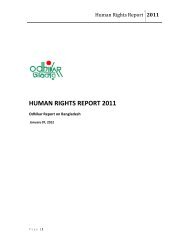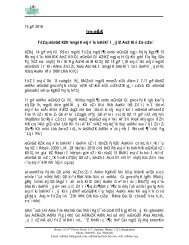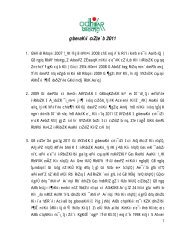Please - Odhikar
Please - Odhikar
Please - Odhikar
Create successful ePaper yourself
Turn your PDF publications into a flip-book with our unique Google optimized e-Paper software.
witness are determined by the consensus of the jirga: "in a jirga an accused does not even have<br />
the right to be heard" (Ali and Arif 1998: 51). This is a parallel legal system and has so far<br />
successfully resisted all forms of modernisation. The tribal social formation is essentially<br />
resistant to social change; hence the extremely low level of literacy, freedom of opinion and<br />
speech, and gender equality.<br />
Another parallel legal system in Pakistan is the Shariah Law. The Islamic legal system was<br />
introduced by the Martial Law regime of General Zia ul Haq. In February 1979, Zia ul Haq<br />
started the process of his brand of 'Islamisation' of the Legal Regime in Pakistan by introducing<br />
the punishment of flogging. At the time when this drive was under way, the Islamic Revolution<br />
in Iran acted as a source of ideological inspiration for the Martial Law government in Pakistan.<br />
In 1979, Pakistan became a "frontline state" in the region and started promoting the geo-political<br />
interests of the United States. The Islamisation of the legal system was part of the ideological<br />
armada deployed by the Zia ul Haq government. State-sponsored jihad required a political and<br />
legal system that could provide structural and ideological support. This was the background for<br />
the promulgation of the Hudood Ordinance in 1979. Under this legal system, a number of human<br />
rights were severely curtailed and/or eliminated. For the first time in the history of Pakistan's<br />
legal structures, sexual intercourse outside marriage was criminalised (Khan 2001). This<br />
Ordinance obliterated the difference between sexual intercourse with consent and rape and<br />
converted both into offences (zina and zina-bil-jabr) respectively. According to this legal system,<br />
it was possible that a (female) victim of rape could report the rape and, if unable to provide<br />
sufficient supportive testimony, be convicted of sex without marriage. The legal requirement of<br />
four adult Muslim males of good character as witnesses of the act of rape virtually eliminated<br />
the possibility for the victims of rape to seek redress. The distinction between the victim and the<br />
criminal was erased: if a rape victim cannot produce four adult male Muslims, she is<br />
automatically convicted of the crime of sex without marriage, or adultery and her accusation of<br />
rape is converted into a confession of guilt: "the rape complaint itself is a confession of zina"<br />
(Khan 2001: 1) and "the onus of providing proof rests with the victim" (Khan 2001: 3). In this<br />
legal regime, where the distinction between the victim and the defendant is arbitrarily<br />
determined, it becomes difficult to speak of the rights of the victim and witness protection. The<br />
Hudood Ordinance, as a parallel legal system, operates in the following domains: sexual<br />
intercourse (fornication outside wedlock, adultery and rape), drinking, theft, and apostasy. Of<br />
these domains, the crimes of sexual intercourse outside marriage and apostasy have produced<br />
considerable risks to the lives and personal safety of the victims of rape and the defendants in<br />
blasphemy trials.<br />
The safety of the accused involved in apostasy or blasphemy, though legally guaranteed<br />
throughout the trial, is not socially guaranteed. Many accused persons have been extra-judicially<br />
killed. In some cases, this has happened outside the court after the release. The law that makes<br />
the arrest and trial mandatory of a person accused of blasphemy was added through an<br />
amendment to the existing blasphemy law found in British Common Law. Clause 295 (c) of the<br />
Pakistani Penal Code is a violation of the basic human rights of freedom of opinion, belief and<br />
expression. Many non-Muslims, such as Christian and Ahmediyyas, have been accused of<br />
blasphemy even though their religious beliefs are based on the non-acceptance of the Islamic<br />
faith. In this legal framework, a basic human right, the right to freedom of belief, can also be<br />
converted into a criminal act. For example, if a Christian citizen of Pakistan asserts that he or<br />
Report 2005<br />
189




